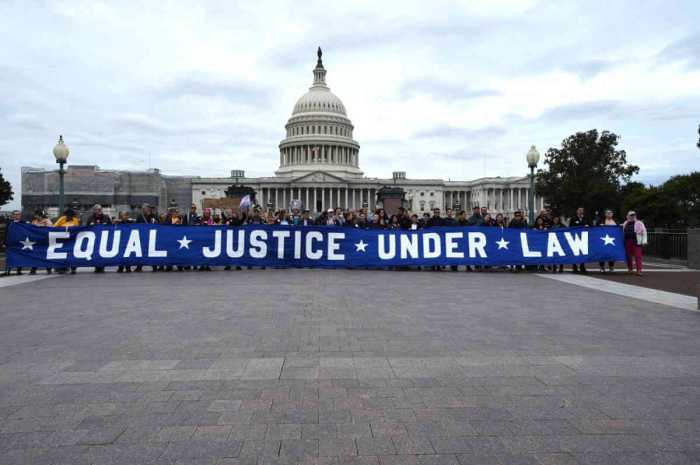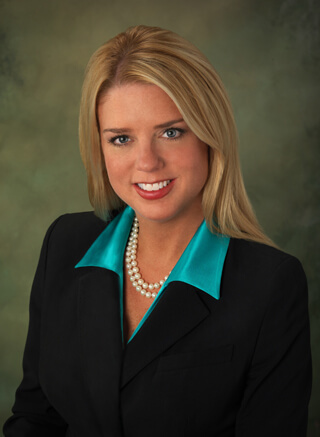The nine-member Washington State Supreme Court refused on June 6 to back down from its earlier decision that Barronelle Stutzman and her business, Arlene’s Flowers, violated the state’s anti-discrimination and consumer protection laws in February 2013 when she told Robert Ingersoll she would not provide floral arrangements for his wedding to Curt Freed.
The court held that Stutzman had no religious-based constitutional privilege to violate the state’s anti-discrimination law, which includes sexual orientation protections in public accommodations.
Stutzman quickly announced she would attempt to appeal the new ruling to the US Supreme Court, which for several months has been pondering whether to grant review in a gay wedding cake case from Oregon.
The Washington court originally ruled on this case in February 2017, but Alliance Defending Freedom (ADF), the anti-LGBTQ litigation group representing Arlene’s Flowers, petitioned the US Supreme Court to review the case, arguing the state violated Stutzman’s First Amendment free exercise of religion and free speech rights. That petition reached the Supreme Court while it was considering baker Jack Phillips’ appeal in the Masterpiece Cakeshop v. Colorado Civil Rights Commission.
In the Colorado case, the high court, in an opinion by Justice Anthony Kennedy, found that the Commission had not given Phillips a respectful, neutral forum to consider his religious freedom claim. Reversing both the Commission’s findings and a ruling from the Colorado Court of Appeals, the Supreme Court focused particularly on comments made by some Commission members during a public hearing suggesting hostility to Phillips’ religious beliefs. The court did not, however, rule directly on the baker’s contention that he enjoyed free exercise of religion and free speech exemptions from the state’s nondiscrimination law.
On June 6 of last year, two days after the Masterpiece decision was announced, ADF supplemented its petition to the US Supreme Court, arguing that Stutzman’s case should be sent back to the Washington high court for “reconsideration” in light of Masterpiece. ADF asserted that Stutzman, like Phillips, had been subjected to a “hostile” forum. The Supreme Court granted ADF’s request. Exactly one year later, the Washington court produced a lengthy decision upholding its earlier ruling.
The Washington State attorney general learned about Stutzman denying flowers for the Ingersoll-Freed wedding in 2013 after Freed’s indignant Facebook post about it went viral. The AG’s office tried to get Stutzman to sign a statement pledging not to discriminate against customers based on their sexual orientation, but she refused. She has consistently argued that her actions were not based on Ingersoll’s sexual orientation — she had happily sold him flowers in the past — but rather on her religious belief that marriage was only between a man and a woman. After the attorney general filed suit against Stutzman, Ingersoll and Freed filed their own lawsuit, represented by the American Civil Liberties Union of Washington, and the cases were consolidated. Stutzman lost in Superior Court in February 2015 and two years later at the State Supreme Court.
In this new case, Justice Sheryl Gordon McCloud, writing for the unanimous state high court, explained that their understanding of the Masterpiece Cake decision is that disputes such as this, in the US Supreme Court’s words, “must be resolved with tolerance, without undue disrespect to sincere religious beliefs, and without subjecting gay persons to indignities when they seek goods and services in an open market.”
Under this standard, wrote McCloud, there was no basis for the Washington court to change its opinion.
“We have painstakingly reviewed the record for any sign of intolerance on behalf of this court or the Benton County Superior Court,” she wrote. “After this review, we are confident that the two courts gave full and fair consideration to this dispute and avoided animus toward religion.”
The Washington court rejected ADF’s efforts to add to the record with claims about religious hostility having motivated the state attorney general to take up the case in the first place. That, McCloud wrote, was outside “the Supreme Court’s explicit mandate to ‘further consider’ our original judgment ‘in light of Masterpiece Cakeshop.’”
ADF was trying to make something of an unrelated incident that occurred while the Arlene’s Flowers case was pending, when it was reported that a café owner in Seattle had “expelled a group of Christian customers visiting his shop” but that despite publicity about the incident the attorney general had not taken any action against that owner. ADF noted that Justice Kennedy, in concluding that the Colorado Civil Rights Commission betrayed hostility to religion, relied in part on its refusal to proceed against several bakers who would not make cakes inscribed with anti-gay symbolism ordered by a provocateur.
The Washington court agreed with Ingersoll and Freed that the attorney general’s posture toward the coffee shop incident was irrelevant. The Supreme Court was concerned about the fairness of the hearing Phillips got before the Colorado Civil Rights Commission, not on any decision as to whether a case should be brought in the first place.
“As discussed above,” wrote McCloud, ‘the Supreme Court in Masterpiece Cakeshop held that the adjudicatory body tasked with deciding a particular case must remain neutral.”
The Washington attorney general’s office was a party to the Arlene’s Flowers case, it was not the adjudicator.
“Courts are wary to question a prosecutor’s decision of which claims to pursue and thus generally ‘presume that prosecutors have properly discharged their official duties,’” McCloud wrote.
The court also pointed out that the consolidated case involved plaintiffs Ingersoll and Freed, in addition to the attorney general representing the State of Washington.
Most of the court’s opinion, however, was devoted to restating its 2017 legal analysis, finding that the First Amendment and Washington state constitutional provisions did not provide a shield for Stutzman against the discrimination charges. The state has a compelling interest to prevent discrimination by businesses, McCloud reiterated.
“Discrimination based on same-sex marriage constitutes discrimination on the basis of sexual orientation,” she concluded. “We therefore hold that the conduct for which Stutzman was cited and fined in this case — refusing her commercially marketed wedding floral services to Ingersoll and Freed because theirs would be a same-sex wedding — constitutes sexual orientation discrimination.”
Even if the state’s nondiscrimination law “substantially burdens Stutzman’s religious free exercise,” that did not violate the First Amendment “because it is a neutral, generally applicable law that serves our state government’s compelling interest in eradicating discrimination in public accommodations.



































